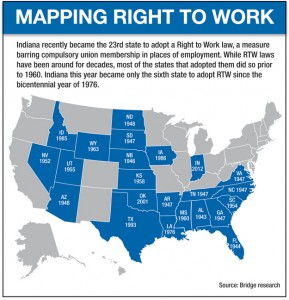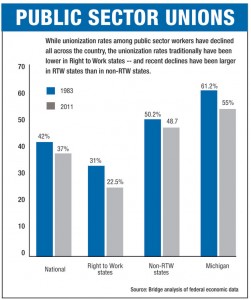Right to Work sparks political frenzy

Supporters of a proposal to end compulsory union membership had high hopes that neighboring Indiana’s recent adoption of Right to Work legislation would lead Michigan to soon follow the Hoosier state’s lead.
That all changed on March 6 when a group backed by organized labor announced a ballot proposal for the November election that would seek to enshrine collective bargaining rights in the Michigan Constitution.
The Protect Our Jobs coalition says its proposed 432-word constitutional amendment would safeguard the wages, health-care benefits and pensions of public and private sector workers.
“This is about protecting the middle class,” said coalition spokesman Zack Pohl.
Politically, labor’s move is akin to one team ripping the ball from its opponent’s grasp late in a crucial playoff football game. Backers of Right to work are now being forced to defend their goal.
RTW laws ban labor contracts that require workers to join unions and pay union dues as conditions of employment.
Rep. Mike Shirkey, the Jackson-area Republican who has been a RTW leader in the Legislature, said his plan to introduce what he calls a “labor freedom” bill this year has been derailed.
“The timing has been altered by the union ballot proposal,” said Shirkey, who owns a manufacturing company in Jackson. “It’s not likely a bill will be introduced until we get a better view of how successful this ballot initiative is going to be.”
Shirkey said he believes passage of the ballot initiative would prevent the Legislature from passing a RTW law, based on discussions he’s had with legal experts.
“This union-boss ballot initiative would be horrible for businesses,” he said.
The ballot proposal is likely to trigger a potentially nasty, expensive battle over the future of collective bargaining rights and union power in Michigan, something Gov. Rick Snyder and many big-business leaders had hoped to avoid.
“We are not going to let the ballot initiative succeed without a fight,” said Jared Rodriguez, president of the West Michigan Policy Forum in Grand Rapids. “We are not going to sit down and roll over on this one.”
The West Michigan Policy Forum, which broke off from the Grand Rapids Area Chamber of Commerce last year, advocates for policies it believes will boost the economy of the region and state. Its top priority is passing a RTW law in Michigan.
Among the forum’s board members are Amway Chairman Doug DeVos; Matthew Haworth, chairman of office furniture maker Haworth Inc.; and Peter Secchia, a prominent West Michigan political and business figure.
Rodriguez said a broad coalition of business interests and others that oppose forced unionization will form to fight the initiative, should its supporters collect the 322,609 signatures needed by early July to put it on the ballot.
And they expect the measure will be put before voters on Nov. 6.
The United Auto Workers and other unions backing the ballot initiative likely will spend millions of dollars on a campaign to pass it.
RTW supporters say there’s far more to the ballot proposal than just ensuring the collective bargaining rights of government and private sector workers.
They say the proposal could overturn many of the legislative victories won by Republicans last year. Among those is a requirement that public employees pay for a share of their health-care costs and a section of the emergency financial manager law allowing labor contracts to be tossed out.
“This would decimate the emergency manager law,” Shirkey said.
Also jeopardized by the ballot initiative are recently passed bills that prohibit public schools from automatically deducting union dues from employee paychecks and a ban on unionization of graduate student research assistants at public universities.
Business groups say passage of the ballot proposal would stall progress the Snyder administration has made in improving the state’s business climate.
They also see the initiative as a thinly veiled strategy by labor groups to boost Democratic voter turnout in the November presidential election.
“This is an omnibus ballot initiative that looks to turn back the clock on the positive reforms that have been accomplished,” said David Jessup, director of government relations at the Small Business Association of Michigan, which supports Right to Work.
Backers of the ballot initiative don’t disagree. They say the various labor-related bills signed into law by Snyder are eroding worker rights in favor of business interests.
“It’s about the protection of jobs, wages and benefits and our voice as a counterweight to Lansing politicians and corporate CEOs who have moved one anti-worker measure after the next through the Legislature,” Pohl said.
Protect Our Jobs, which has started to collect signatures to put the proposed constitutional amendment on the ballot, claims there are 80 pending bills in the Legislature that would erode workers’ collective bargaining rights.
The political ins and outs of RTW were complex and contentious even prior to the emergence of the collective bargaining ballot proposal.
A loose coalition of small business lobbying groups, Tea Party supporters, conservative Republican lawmakers and the Mackinac Center for Public Policy have been pushing RTW for years.
“A lot of people in the plants are upset that their dues are going to pay for things they don’t support,” said Norm Hughes of Michigan Freedom to Work, which he describes as a grass-roots organization with thousands of Tea Party supporters.
“They feel strongly they should have to the right to choose whether or not they want to belong to a union,” said Hughes, an architectural engineer from Metamora. “We see it as a lifeline for the economy, too.”
Gov. Rick Snyder has said repeatedly that he does not want to see a RTW bill reach his desk. Snyder has called the issue too divisive and said it’s not on his agenda of initiatives to improve Michigan’s business climate.
But some say privately they think Snyder would sign a RTW bill, should one pass the Legislature. The Mackinac Center posted a link to a 2010 video in which Snyder, then campaigning for governor, said he would sign such legislation.
Whether a bill gets to his desk -- assuming the union collective bargaining initiative fails -- could depend on whether Senate Majority Leader Randy Richardville allows the Senate to take up the measure.
Richardville, a Monroe Republican, has said he’s generally against right to work, but supports it for teachers.
Business Leaders for Michigan, a group of the state’s top business leaders that has close ties to Snyder, also opposes RTW.
“In our view, Right to Work and other efforts to amend the constitution at this time would be a distraction and divisive -- just as we need to come together as a state to continue our recovery,” spokeswoman Kelly Chesney said in an email.
The politically powerful Michigan Chamber of Commerce and Michigan Manufacturers Association have taken similar positions.
“We’ve said all along we prefer not to discuss (RTW),” said Michael Johnston, vice president of government affairs at the MMA. “It draws attention from more important issues such as eliminating the industrial personal property tax, regulatory changes and streamlined government.”
Chamber President Rich Studley described the proposed constitutional amendment on collective bargaining a “bizarre overreach” that wouldn’t create jobs or boost the state’s economy.
“It’s interesting to the point of irony that many in the labor movement were complaining that any discussion of Right to Work in Michigan was divisive,” he said. “Isn’t it equally partisan and divisive for organized labor to launch a ballot initiative to preempt bills that haven’t even been introduced yet?”
Last November, voters in Ohio overturned a new law that stripped most collective bargaining rights from the state’s 350,000 public workers and required them to pay at least 15 percent of their health-care costs.
That defeat for Republicans and an ongoing effort in Wisconsin to recall Republican Gov. Scott Walker has supporters of Michigan’s initiative confident that voters will approve it if the measure reaches the ballot.
But opponents say a defeat at the polls would accelerate their efforts to make Michigan a RTW state.
“We see this as an opportunity” to bolster RTW, Shirkey said. “We’re going to be strongly engaged across the state talking about this.”
Recent statewide polls earlier this year showed support for both RTW and constitutionally protected collective bargaining rights. But some say those views could shift significantly as the two sides beat each other up in television advertising campaigns.
A February poll by Mitchell Research & Communications Inc. found that 56 percent of likely voters somewhat or strongly supported RTW.
An EPIC-MRA poll last April found similar support, with 54 percent saying they would vote in favor of a RTW ballot proposal, or were leaning toward voting in favor of it.
But support for RTW dropped to 43 percent when voters were told that workers who choose not to belong to unions or pay dues in a closed shop still receive all the benefits of a union contract.
In the same poll, voters also expressed support for constitutionally protected collective bargaining rights, with 57 percent saying they would vote for it, or were leaning toward supporting the measure.
Snyder has said he doesn’t think either RTW or a constitutional amendment protecting collective bargaining are helpful in his effort to “reinvent” Michigan.
But EPIC-MRA pollster Bernie Porn said Snyder must show stronger leadership if he wants to see both measures killed.
“He can’t keep dancing like he has been,” Porn said.
Rick Haglund has had a distinguished career covering Michigan business, economics and government at newspapers throughout the state. Most recently, at Booth Newspapers he wrote a statewide business column and was one of only three such columnists in Michigan
Business Watch
Covering the intersection of business and policy, and informing Michigan employers and workers on the long road back from coronavirus.
- About Business Watch
- Subscribe
- Share tips and questions with Bridge Business Editor Paula Gardner
Thanks to our Business Watch sponsors.
Support Bridge's nonprofit civic journalism. Donate today.
See what new members are saying about why they donated to Bridge Michigan:
- “In order for this information to be accurate and unbiased it must be underwritten by its readers, not by special interests.” - Larry S.
- “Not many other media sources report on the topics Bridge does.” - Susan B.
- “Your journalism is outstanding and rare these days.” - Mark S.
If you want to ensure the future of nonpartisan, nonprofit Michigan journalism, please become a member today. You, too, will be asked why you donated and maybe we'll feature your quote next time!

